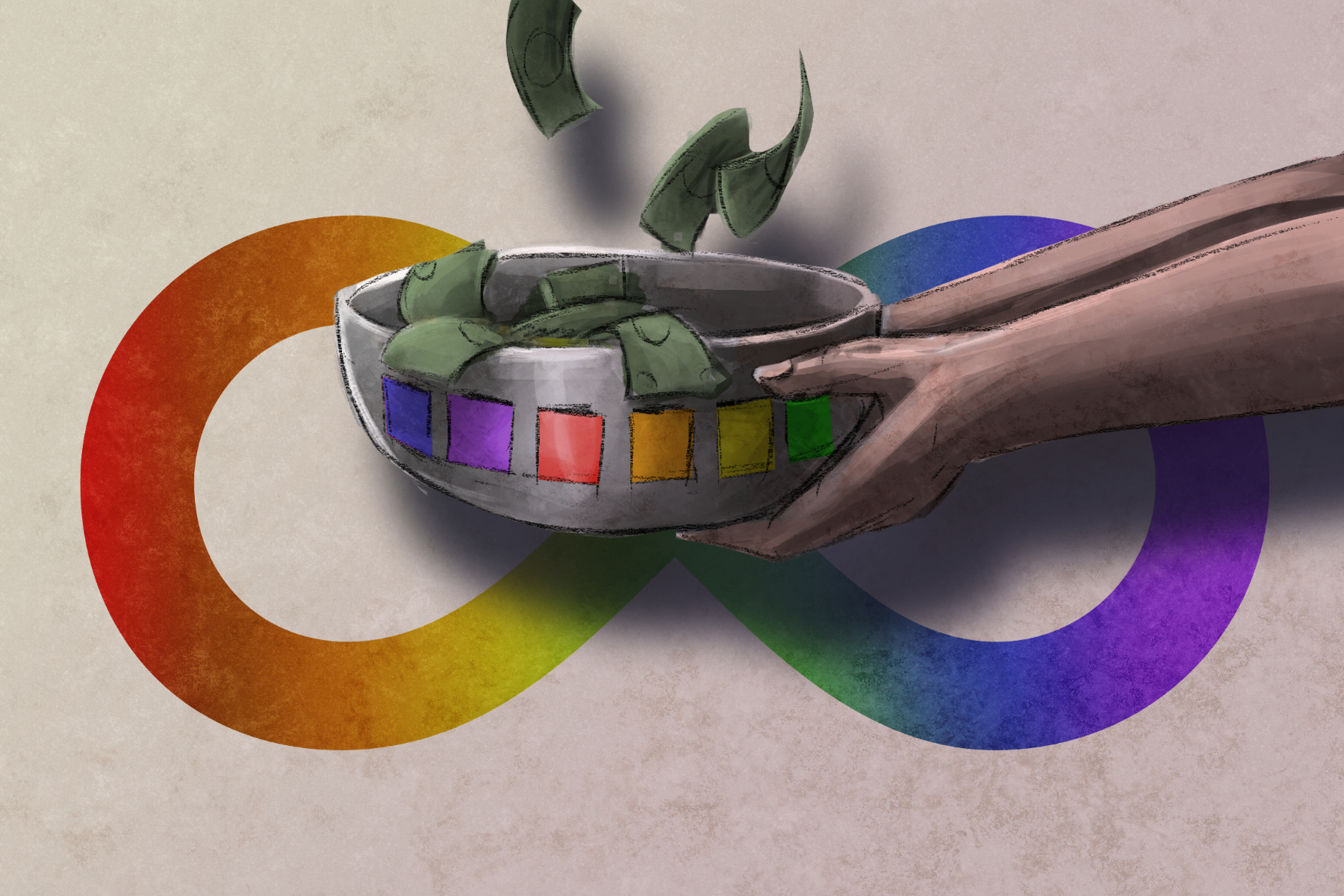Hey there Mr. Rober. Can I call you Mark? My name is Julianna, and I’m a proud autistic adult. I was unexpectedly diagnosed with ASD at age 19, the age I am now, and most people in my life don’t believe me when I share this information with them. It’s likely because my autism doesn’t look like your son’s autism, or like many of the little boys who are autistic that tend to shape people’s personal image of what autism is. Still, I’m autistic, and I’m just as autistic as anyone else on the spectrum.
A lot of people fail to understand that autism is a spectrum of many different experiences. This spectrum isn’t linear, but a circle of endless possibilities that make us who we are. For example, I have intense sensory issues, especially when it comes to sound and touch. I’m almost constantly stimming to regulate my emotions, my special interests are pretty much my entire personality and I have social anxiety, but I don’t have a hard time verbally communicating with others. Others with autism may experience sensory issues to a lesser extent with more verbal difficulty, but this hypothetical person and I aren’t more or less autistic than the other.
You may be wondering why I’m writing this letter to you, but I doubt that. After all, you’ve received a lot of justified criticism from the autistic community. No pun intended, but you missed the mark big time my dude. I’m not stimming with glee as my thoughts flow into this Google document, but this has to be said. Autistic adults are tired. Why? We are tired of being ignored by neurotypical people. We are tired of performative activism that doesn’t actually benefit our community. We are tired of neurotypical people leaving us out of the conversation. Most of all, we are tired of having to advocate for our existence time and time again, only for people to tell us we’re either “not autistic enough” to speak up or “not capable of communicating for ourselves.” It’s your turn to listen, so please, listen.
Let’s Start With Your Video
This is where it starts: “The Truth About My Son,” a video you created two years before building up the courage to share it with the world. I’ll be the first one to say it’s not complete dog s—. In fact, a lot of it is incredibly sweet. Your explanation of sensory issues was spot on, you debunked some harmful stereotypes associated with autism, and it’s clear that you care for your son so, so much. That being said, let’s talk about where you went wrong.
1. Your use of functioning labels (ex. high functioning, severely autistic, etc.) is inaccurate to how an autistic person experiences autism. All those labels do is describe how much of a “burden” a specific person’s autism is to a neurotypical person. They tell us nothing about which areas a specific autistic person thrives in versus what they need help with or accommodations for. We don’t like this language because there is no such thing as “severely autistic,” so please cut that language from your repertoire.
2. Just say “disabled.” It’s really irritating when people try to sugarcoat our experience by calling us “special needs”; most of us aren’t ashamed of being disabled. In fact, lots of us feel a strong sense of empowerment within our disabled identities.
3. On a similar note, painting us as these “super beings” is more harmful than you realize. There was a part in your video where you described disabled people as “giants living amongst us mere mortals.” But we’re people just like you. We don’t want to be put on this pedestal, especially when that pedestal often pries away our human label and identity. It’s honestly infantilizing, and even more, it’s dehumanizing.
4. This is going to be blunt: There was a part of your video that truly disgusted me. You said a lot of ableist things, man. Let’s start with these quotes: Autistic people won’t “benefit the GDP or get a Ph.D. to cure diseases,” and your son will “never be the star of his little league team, he won’t be the first person to step on Mars nor will he invent the cure to cancer.” Are you forgetting that the world’s richest person is on the autism spectrum? There are so many extremely successful and influential people in our world who are autistic.
Not only that, but there are so many autistic people who are living just as you are, and you probably don’t even realize they’re autistic. Before getting diagnosed and receiving the academic accommodations I needed, I graduated high school with a 3.7 GPA, participated in multiple extracurricular activities, took AP and honors classes, received awards and scholarships for my work, and I now attend one of the best universities for education majors in the country. Autistic people can reach as high as they want to. To assume their autism prevents them from doing so is, frankly, ableist bulls—.
Your Biggest Mistake of All
I’ve tried to write this portion of the article on so many separate occasions, but doing the research and spelling it out for you is beyond triggering as an autistic person. Let’s get this over with, shall we? Your fundraiser, Color the Spectrum, raised $3.63 million dollars within its three-hour time span. This money was raised to support Next for Autism. WHY? Apparently you didn’t go full force in your research when selecting a charity to donate to, so let’s break this down into categories.
Autism Speaks
Next for Autism has a history of partnering with Autism Speaks, an autism group that supports finding a cure for autism, fearmongers to caretakers of autistic children and only puts 1% of their money toward family services. I could write a whole-ass dissertation on why I hate Autism Speaks with my entire heart and soul, but if you don’t believe me, watch this fearmongering piece of garbage they genuinely thought was beneficial to make (content warning: If you’re autistic or have autistic loved ones, this may be triggering for you. It sure is for me). No organization that truly represents autism would ever support Autism Speaks. Yet in 2018 alone, Next for Autism donated $170,000 to Autism Speaks and $1.1 million to organizations that support ABA therapy, which is a perfect segue into even more triggering content — YAY!
ABA Therapy
ABA therapy, which stands for applied behavior analysis, is defined on Psychology Today as “a type of therapy that focuses on improving specific behaviors, such as social skills, communication, reading, and academics as well as adaptive learning skills, such as fine motor dexterity, hygiene, grooming, domestic capabilities, punctuality, and job competence.” It operates as a reward system, where the patient is conditioned by being rewarded for “positive” behaviors and is ignored (or punished) for “negative” behaviors.
It may not sound horrible, but many autistic adults have spoken out on many occasions against ABA therapy due to the trauma they have from the conditioning. The argument (that I agree with) is that ABA therapy teaches autistic children to suppress autistic traits in favor of presenting as more “normal” or “neurotypical,” which is also known as masking and has so many psychological consequences on autistic people: “ABA is harmful and abusive, I don’t want my child to be taught to conform or obey blindly. She needs to be respected and able to grow as she is.”
If the voices of autistic adults aren’t enough to convince you, let’s look at the founder of ABA therapy, Ole Ivar Lovaas. According to autisticuk.org, this same form of therapy was used to “cure children who were at risk of developing ‘adult sexual normalities’ (i.e. gay or transgender).” This is commonly known as LGBTQ+ conversion therapy. He also had some deeply disturbing and dehumanizing perspectives on autistic people, proven by this direct quote:
“You see you start pretty much from scratch when you work with an autistic child. You have a person in the physical sense — they have hair, a nose and a mouth —but they are not people in the psychological sense. One way to look at the job of helping autistic kids is to see it as a matter of constructing a person. You have the raw materials, but you have to build a person (Lovaas cited by Chance, 1974, p76).”
Read this article and listen to autistic voices as you learn more about ABA therapy, its harmful origins and the damage it has directly caused and continues to cause. This is not okay.
Seeking a Cure for Autism
Next for Autism’s mission statement doesn’t directly support a cure for autism. However, there’s lots of evidence that proves they absolutely do. Next for Autism, in partnership with New York Presbyterian Hospital, created Center for Autism and the Developing Brain. The group’s mission statement includes the following: “conducting research that enhances the understanding and treatment of autism spectrum disorders.”
That sounds like looking for a cure to me! As mentioned earlier, Next for Autism has also partnered with and donated to Autism Speaks, a horrible organization that absolutely advocates for a cure. This is advocating for eugenics, plain and simple. Autism is not some disease that needs to be cured. It’s a different way to perceive and interact with the world, and different doesn’t mean wrong. I am so proud to be autistic and I don’t want anyone to take my autism away from me —to take away my autism is to take away what makes me who I am. It’s the same reason why most of us can’t stand person-first language: We aren’t just people who happen to “have autism,” we are autism and we are happy for it.
Let’s Wrap This Up, Mark
You messed up. The celebrities who participated (which can be found in the description of the event) messed up. There’s no getting around that and there’s no changing that. Even though I found some autistic responses who point out benefits that came out of this event, the consensus is majorly negative. You said ableist things, you gave money to a horrible organization and you still haven’t apologized.
I don’t think you’re a horrible person. People are more complex than “good” and “bad,” and all of us have hurt someone in some way at some point (some much more than others of course). You hurt a lot of people, and we expect an apology. Listen, learn from us and educate yourself. I want to forgive you, and I hope that someday you give me a reason to. If not for your autistic audience, learn and apologize for your son who’s going to be in our position in the blink of an eye.

















